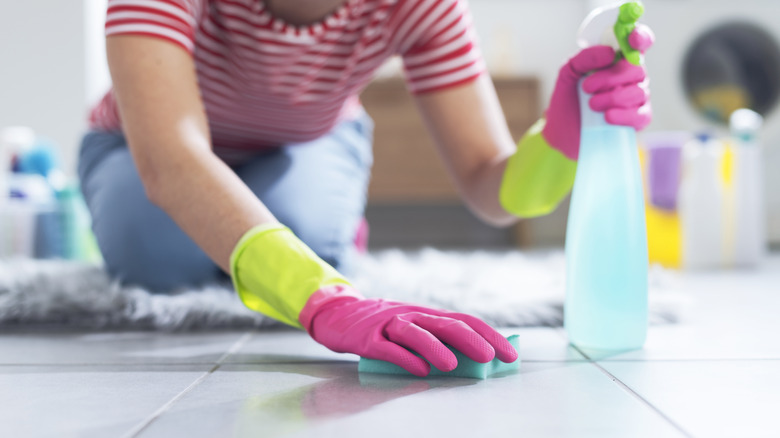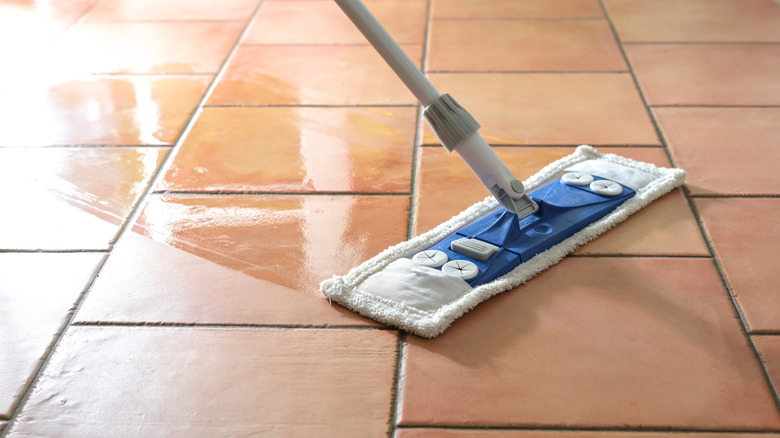Products And Cleaners That Are Safe For Porcelain Tile Floors
We may receive a commission on purchases made from links.
Porcelain tiles are among the most popular flooring choices in both classic and modern homes. They're timeless, long-lasting, versatile, and available in a wide variety of styles and applications. Unlike ceramic tiles, porcelain can withstand many years of use without becoming damaged. It's thicker, denser, and less porous than ceramic, making it far more resistant to cracks, stains, and water damage. Porcelain tile is also lower maintenance and easier to clean than other types of flooring. However, it's important to know which products are suitable for porcelain because certain cleaners and tools can damage your floor tiles over time. When it comes to preserving the shine and cleanliness of porcelain floors, less is more. In fact, the simplest way to achieve dazzling porcelain floors without any chemicals is by using nothing but water.
Like all surfaces in your home, occasional deep cleaning is essential to extend their lifespan. The great thing is, you can get your floors sparkling with minimal effort by using ingredients you already have at home. If you prefer the convenience of store-bought cleaners, stick to top-rated brands that are specially formulated for porcelain tile — don't worry, we have a few suggestions. Caring for porcelain floors is straightforward and simple, but there are a few steps involved to ensure that you achieve the best possible results. The key is to stay proactive with routine cleaning to help you avoid dealing with time-consuming messes later on.
Safe products to make your porcelain floors shine
Before cleaning your porcelain tiles with any liquid products, it's essential to first remove the surface debris by sweeping or vacuuming. This should be done at least once per week to prevent dirt and dust from accumulating. In high-traffic areas or homes with pets, once weekly may not be enough. The next step is simply cleaning the floor with water. Though porcelain is durable, it must be treated with specialized products to preserve its smooth surface. However, for day-to-day maintenance, you may not even need anything but warm water and a mop to remove visible dirt.
When it's time for deep cleaning, which should be done at least once a month, mix a solution containing one gallon of water and ¼ cup of white vinegar. Vinegar is a common household ingredient that works wonders on dirty porcelain floors. Diluted in water, the acetic acid dissolves stubborn grime and bacteria without causing scratches or blemishes. Meanwhile, using abrasive products is one of the most common mistakes when cleaning porcelain tile. Avoid scouring pads and scrub brushes with metallic bristles. Instead, stick to microfiber mops or soft sponges. If the vinegar solution is not enough to get your floors clean, you may also use mild soap or a store-bought floor cleaner. While there are many products out there that are suitable for porcelain tiles, some of the best-rated options include Better Life Floor Cleaner and Nellie's Floor Care. Cleaning the grout lines is just as important as the tiles themselves. Apply a homemade grout cleaner with one part baking soda and two parts hydrogen peroxide, allow the paste to set for 15 minutes, then scour with a firm-bristled brush and rinse with water.

